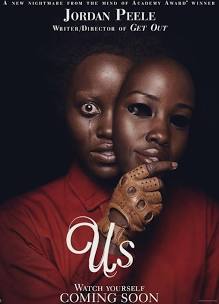Jordan Peele’s “Us” uses horror to critique American life

Director Jordan Peele has created yet another successful, gripping movie.
April 3, 2019
Rabbits, Sewers and Scissors, oh my!
On the heels of his widely successful (and brilliant) 2017 directorial debut, Get Out, director Jordan Peele’s sophomore project, Us, tells the story of a modern day family placed in thrilling circumstances when confronted and attacked by their bitter clones. For his sophomore feature, Peele veers from the overt social commentary of Get Out in favor of sheer horror through and through, rife with subtext critiquing the American experience.
The success of Get Out is a lot to live up to. Not only was it brilliantly crafted, and so ground breaking that it became its own moment in pop culture, it was the first horror film in decades to win a best picture nomination at the 2018 Academy Awards, and it earned a whopping 255.5 million dollars in the worldwide box office on a 4.5 million dollar budget. Needless to say, it would be difficult for even a seasoned director to follow up that success.
Despite the mounting hype, Us did not disappoint. Visually and cinematically, the movie is among his most ambitious work. From big explosions to intricate set designs, Us feels like a blockbuster. Peele’s first of many, one would hope- as this particular blockbuster feels fresh and innovative in a sea of similar superhero movies.
This movie had many positive aspects, including comedic elements. People often question how Peele was able to make such a drastic transition from comedy to horror, and the reason he was able to is because the transition isn’t all that drastic. This movie is one of the funniest of the year. It doesn’t have laugh out loud moments throughout, but every so often, when Peele sprinkles his signature comedy into the plot, it hits hard. I immediately think back to one scene in particular, involving an Amazon Alexa (or Ophelia, as it’s called in this universe) and the song “Good Vibrations” by The Beach Boys, which turned a sequence that shouldn’t be funny into a “laugh so hard your belly hurts” moment.
Another aspect of the film that worked was its deep social commentary and rife symbolism hidden in plain sight. The story arc seemed to be heading towards a singular direction up until the last 5 minutes, in which everything unravels. I immediately rethought my allegiances and feelings about particular moments, and the movie does not end the moment one leaves the theater. The subvert, yet powerful critique on America, and the tiny symbols that unconsciously indoctrinate these ideals in the viewer, makes it so the viewer is constantly revisiting it in their head.
In Get Out, Jordan Peele critique swhite liberalism in our country, and the racist tropes inherent within it. In Us, Jordan Peele critiques all of society. He takes aim, in a smart and discrete way, at the ways in which America purposefully forgets our painful history, others people, and suppresses our shameful past so far down that it often times is erased from our history books, if not completely rewritten.
This movie’s brilliance lies in the fact that despite the strong themes, one does not need to overthink it. Whether or not one catches all of the symbolism, or they walk away from this thinking of no deeper meaning, they are guaranteed to have a wild time. There is something in this movie for every viewer.
There are layers, each of which are brilliantly crafted. The comedy, the themes, the action; all of these factors set this movie, and Peele’s horror films as a whole, apart from its lesser counterparts.
It is impossible to discuss what works without mentioning the acting. A story this absurd is hard to sell. Spearheaded by the incomparable Lupita Nyongo, the amazing acting in this film believably sell the story. All of the actors, Nyongo in particular, deliver heart wrenching, at times malicious and intensely human performances that bring an astounding sense of heart to this film. These performances are complex, dual (literally-the protagonists also play their clone family) and layered-and it brings so much to this film.
Everyone wants to compare to this movie to Get Out. The comparison is wholly inevitable, considering the expectations that Peele has to live up to. Peele, himself, seems to want to compare himself as well. This movie came off as though he is aware of the mounting pressure on him. Every once in a while, the explosions and the nonstop violence was a bit too much. One could hypothesize that one way Peele felt like he could exceed his previous work is by making it larger, and by giving it a more blockbuster feel. This does fall flat at parts. The beauty of his previous work is its simplicity and that’s what he does so well. However, this one minor flaw does not take away from the viewing experience as a whole.
People love to refer to great directors as “The New (insert precious directors name here).” In Peele’s case, this does him a disservice. Jordan Peele is not the new Hitchcock or Kubrick. He is the first Jordan Peele- and the horror genre is significantly better because of it.

